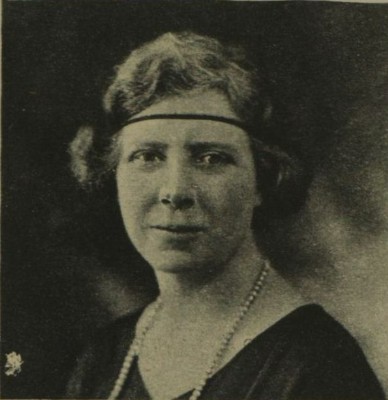
Mary Pollock Grant
1876-1957
Suffragette and Liberal Party Politician
Miss Mary Pollock Grant also known as May Pollock Grant and Marion Pollock, was a Scottish suffragette and Liberal Party politician.
She was the eldest daughter of Dr C.M. Grant, the minister of St Mark's parish church in Dundee. She was educated at the High School of Dundee and in Nordausques, France.
In 1905 she became an educational Missionary in India for the Church of Scotland. In 1911, back in Scotland she worked for women's rights in Dundee as a member of the militant Women's Social and Political Union. In December 1912 she was sent to Perth, Scotland prison for smuggling herself with others into the Music Hall Aberdeen. They had intended to disrupt a Liberal meeting featuring David Lloyd George. She was imprisoned as Marion Pollock. Throughout 1913 and 1914 she wrote numerous letters to the press and was frequently ejected from public meetings for causing a disturbance. Disguised in widow’s weeds and glasses, she managed to get into a Labour meeting held by Ramsay MacDonald in the Gilfillan Memorial Hall, but was roughly dragged out by eight burly men – an onlooker describes this as “one of the strongest arguments for women’s suffrage that I have ever seen.”
At the outbreak of war in 1914 she enlisted as a nurse with the Voluntary Aid Detachment at Caird Hospital, Dundee. In 1916 she joined Margaret Damer Dawson's Women Police Service, serving in London as a Constable, Sergeant and by 1918 she had reached the rank of Sub-Inspector. She left the organisation at the end of the war.
Grant then got involved in party politics, joining the Liberals. To go from suffragette to policewoman to Liberal politician was a path also trodden by Mary Sophia Allen. By 1922 she was spending most of her time as a Public Lecturer on Politics and social problems. She was then selected as a David Lloyd George supporting Liberal candidate for Leeds South East constituency for the general election. Her opponent was the sitting Labour MP who was returned unopposed in 1918. As there was no Unionist candidate, she polled a strong vote.
After the Lloyd George and Herbert Asquith wings of the Liberals re-united, she stood as Liberal candidate in Pontefract, where the Liberal had come third in 1922. Once again it was a three-cornered contest and Grant was unable to avoid a squeeze on the Liberal vote.
She did not contest the 1924 General Election. By July 1928 she was selected as Liberal candidate for Salford West, another Labour/Unionist marginal where the Liberals were not expected to do that well. She again finished third.
In the 1930s she took up Christian Science and worked as a practitioner and healer until four years before her death. In World War 2 she did Civil Defence work in London.
To make your own nomination download the nomination form here